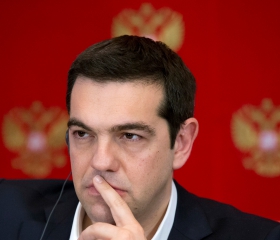On April 7, 2015 Greek Prime Minister Alexis Tsipras made his first travel having Moscow as destination. His visit to Russia attracted the attention of many states, especially of those within the EU. Talks between Mr.Tsipras and Mr. Putin touched upon a wide range of issues, however it is very difficult to extract their meaning in the twilight of the Ukrainian crisis and a possible Grexit. In this context, the major question would not be other but, what are the real purposes of Mr. Tsipras’ visit to Moscow?
On April 7, 2015 Greek Prime Minister Alexis Tsipras made his first travel having Moscow as destination. His visit to Russia attracted the attention of many states, especially of those within the EU. Talks between Mr.Tsipras and Mr. Putin touched upon a wide range of issues, however it is very difficult to extract their meaning in the twilight of the Ukrainian crisis and a possible Grexit. In this context, the major question would not be other but, what are the real purposes of Mr. Tsipras’ visit to Moscow?
An echo lost in perception and EU anxiety
There’s no denying the fact that Greece is still a full member of the EU and NATO. On the other hand, the country traditionally holds friendly relations with Russia for both countries share strong ties in some spheres of partnership. Unfortunately, EU fears of a new cold war in Europe and Eurasia are still alive and kicking. Nonetheless, we need to overcome this illusory concern understanding that we live in a transitional international system.
The previous Greek government avoided to intervene in the conflict in Ukraine and was calling for a diplomatic solution as an axis of a compromise. The new leadership continues to insist on the diplomatic solution but also argues that deep tensions between Russia and the EU aggravate the economic vulnerability of many EU states, including Greece.
New foreign policy model corresponding to Greek economic needs
Charles Darwin once said “Everything that doesn’t evolve will vanish”. This is an important part of eternal wisdom that also refers to foreign policy. Greece’s geopolitical and economic value is out of question. It is also impossible that Greece could stop holding ties with Moscow. What drives the EU into misperception about Mr. Tsipras’ visit is the momentum of this meeting. Of course, there is reasonable answer to it. It is not a rare practice for states to pay attention to their foreign affairs when they face serious economic problems. Having strong ties with everyone is impossible, but having special relations based on openness and mutual understanding is both feasible and ideal. Moreover, diplomacy never stops, even at war. That is why a formal visit of a new Greek Prime Minister to Moscow is totally rational and by no means symbolizes a diversion from the EU path.
During the first days after the new Greek government came to power, the European anxiety was about meeting between Greek officials and Russian Ambassador in Athens. The EU’s anxiety came to an end only when Mrs. Psaki mentioned that there was no negative signal that Athens sent with such a meeting. Moreover, it is crucial to remember that both Mr. Tsipras and Mr. Varoufakis emphasized priorities in their visits to their partners and counterparts within the EU.
To sum up, Greece has the need to improve its relations with states like the US, Russia and China. On the other hand, the EU will definitely benefit from the rising role of Greece. EU membership is a strong pillar for Greece, however not a single EU member-state uses Brussels as the only basis of their diplomatic ties. The European Neighbourhood Policy proves the European interest towards third states.
Greece is neither a “Russian pivotal state” nor a “Moscow Trojan Horse”, but rather a potential bridge between Russia and the EU
Mr. Tsipras made a clear statement about his visit to Moscow that calmed down the unreasonable concern expressed by EU officials. He said, “Greece is not a beggar that goes around to ask for money and help”. This statement reminds of a similar statement the Greek Prime Minister made in Berlin. President Putin, in turn, proved the accuracy of Greek Prime Minister’s statement emphasizing that “there was no quest for a loan”.
Negotiations between Greece and its creditors are still a hot matter for both Greece and the EU. The necessary regulations of the Hellenic market would be inevitable without privatisations in which Russia has already manifested its interest. Another bilateral issue that is crucial for Greek economy is the reduction of commercial relations between Russia and Greece. In the most important sectors of Greek economy (tourism and agriculture) Russia was a major partner, and the EU sanctions against Russia exposed Greece to economic vulnerability. The commercial reduction reached a huge number of about 40%. Moreover, energy sector is no less important to Greece and its energy autonomy. Natural gas distribution is a major potential economic activity for Greece. However, according to the Greek government, all potential synergies in energy sector are going to be built in cooperation with the European institutions. Again, there are no dark moves by the Greek side. It is very important to mention that Greek natural gas market depends on the Russian natural gas (over 60%). The price of natural gas that Greece imports from Russia is a critical quest for Greek-Russian relations.
Besides, the meeting between Greek and Russian officials proved that Greece continues to support the Minsk agreement concerning on the crisis in Ukraine. To sum up, Greece and Russia are on the way to frame a new status of their relations, and the only certainty we could hold is to keep our forecasts away from rushing into predictions. Greece’s goal is to develop the EU-Russia cooperation and not to pretend to be a “Russian Trojan Horse’’.





